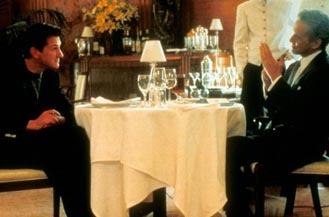A-List: Sean Penn
By Sean Collier
November 25, 2008
BoxOfficeProphets.com

It's almost impossible to stay at the top of your craft when you've been dodging scandal and gossip for two decades, but Penn has made excellent films while surrounded by bad headlines since the Carter administration. Twenty-five years of bad press – and much of it (perhaps most of it) his own damn fault – and he remains not only excellent, but almost universally regarded as such.
His career is almost free of missteps. (Okay, there are two that I can think of: making a movie with Madonna and going full retard, but anyway...) Lots of sudden changes, lots of time spent reinterpreting his image and analyzing where to go next. Echoes of one character show up a decade later, but never in the form of repetition – it's like those characters stayed alive and aged. You wonder if every character he's ever played is still rattling around in there somewhere.
One Best Actor statue seems criminally low for someone with this many perfect performances. Hell, if they had given out two in 2003, he could've won them both. He'll have to get into the ring with Mickey Rourke to take home another one this year, but thanks to the magic of ever-earlier buzzmaking, I'd say he has a good shot at it. While he deserves all the acclaim he gets, though, he doesn't need it. He's the best actor alive.
With hope that the entire population of California goes to see Milk, The A-List presents the best of Sean Penn.
At Close Range
I'll ruffle some feathers by jumping this far into Penn's career to start, but there's really something about this role. For a hundred minutes, Penn's Brad Whitewood Jr. – sort of the bizarro world Jeff Spicolli – ignores the troubled youth act and stays steady, pointed, and maybe even a bit happy, while his typhoon of a father (a manic, almost ridiculous Christopher Walken) orbits around him. Then, in the closing minutes, he explodes. It's a careful, calculated performance – maybe Penn's first truly mature role.
Dead Man Walking
The first film Penn should've won for, Dead Man Walking wouldn't be half the film it was without him. Rocky Horror fanboy though I may be, Sarandon couldn't quite keep up. Her performance is very good, but the subject matter is just too damn heavy for her. Tim Robbins could be an excellent director, but he tries a bit too hard – a number of the frenetic flashback/dream sequences in the film really needed to go. What's at the heart of Dead Man Walking is the fundamental injustice of the death penalty, and Penn seems to know that his job is twofold – to deliver a moving performance, and to illustrate just how far gone the people that actually make it to the hangman are. The semi-fictional Matthew Poncelot demonstrates just what you have to be to get executed in America – poor, misguided, and dumb. The crime is irrelevant.
The Game
There are very few supporting roles on Sean Penn's résumé, but this one is pretty damn good. As in At Close Range and Dead Man Walking, Penn's performance in The Game demonstrates his almost uncanny ability to feel the shape of the movie around him. His character's mix of rationality and madness are a perfect match with the spirit of the film. He only appears three or four times throughout the film, but figuratively, he's in the shadows of every scene. In a movie where everything is suspect, he's the part you (almost) always believe.
Sweet and Lowdown
Somewhat forgotten now despite another Best Actor nomination for Penn, Woody Allen's unlikely guitar epic (and slight Fellini homage) finds Penn's charm still as present as ever, if turned upside down. Woody originally wrote the part for (three guesses) himself and initially offered it to Johnny Depp, but Penn nailed it, taking a character that didn't make a whole lot of sense and making him captivating as hell. Woody fans who haven't caught Sweet and Lowdown are missing out – it's probably the best of the past ten years.
Mystic River
There could easily be a "Films set in Boston" A-List. Hell, there could be a "Films set in Boston and made in the first decade of the 21st century" A-List. (Come to think of it: Mystic River, Gone Baby Gone, The Departed, Blow, Little Children. Now that that's out of the way.) There's very little more to say about Penn's dark, intimidating turn as Jimmy Markum; he (finally) won his Oscar for it, it was the best reviewed film of the year, and like everything else, every frame of the film benefits from his presence. Besides, you're probably already in another room yelling "Is that my daughter in there" at somebody.
21 Grams
2003 was not only the best year of Sean Penn's career, I can't think of many actors who put together a better one-two punch than Mystic River and 21 Grams. I actually thought his performance in Alejandro Gonazlez Inarritu's spastic tragedy was a shade better than his much louder role in Mystic River, but it's splitting hairs at that point. The motivations of Penn's Paul Rivers are lost, even to the character himself: he searches for the source of his donated heart seemingly for lack of anything better to do. It's almost impossible to play drive without motivation, but – like every role – Sean Penn knows just how to do it.